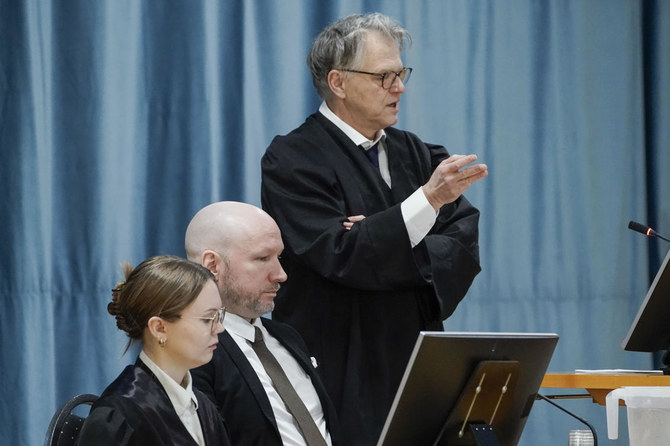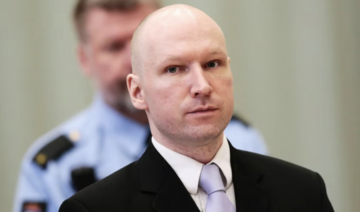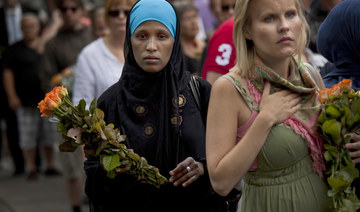OSLO: A tearful Anders Behring Breivik, the right-wing extremist who killed 77 people in 2011, on Tuesday accused Norway of trying to “push (him) to suicide” with strict prison conditions, while authorities insisted he remained extremely violent.
“I have the impression that the government’s aim is to try to push me to suicide,” Breivik said on the second day of a court hearing in the lawsuit he has brought against the Norwegian state over his prison conditions.
“They are close to succeeding. I don’t think I will manage to survive much longer without human relations,” the 44-year-old told the court, convened for security reasons in the gymnasium of Ringerike prison where he is serving his sentence.
Held apart from other inmates in high-security facilities for almost 12 years, Breivik claims his extended isolation is a violation of Article 3 of the European Convention on Human Rights, which prohibits “inhuman” and “degrading” treatment.
The lawyer representing the state, Andreas Hjetland, defended Breivik’s conditions — which are strict but comfortable — as warranted since he still poses “an absolutely extreme risk of totally unbridled violence.”
On July 22, 2011, Breivik set off a bomb near government offices in Oslo, killing eight people, before gunning down 69 others, mostly teens, at a Labour Party youth wing summer camp on the island of Utoya.
He was sentenced in 2012 to 21 years in prison, which can be extended as long as he is considered a threat.
At one point during his testimony on Tuesday, Breivik, who takes anti-depressants, broke down in sobs.
“I understand that... revenge is important and that a lot of people hate me. But I’m still a human being,” he said.
He claimed he had distanced himself from his crimes — which he attributed to his “vulnerability” to radicalization — and said he thought of suicide “every day.”
Breivik has apologized in the past and showed no remorse on other occasions.
His testimony left families of the victims unmoved.
“He cries when he feels sorry for himself but when he says he’s sorry for what he did, he’s cold and cynical. I don’t believe him for a second,” Lisbeth Kristine Royneland, the head of a support group for families of the victims and who lost her 18-year-old daughter on Utoya, told AFP.
During Tuesday’s proceedings it emerged that Breivik tried to kill himself in 2020 by hanging himself with a towel, but made sure to inform prison guards first, the state’s lawyers noted.
In 2018, he also launched a disobedience campaign, drawing symbols such as swastikas with his feces, shouting “Sieg Heil” and undertaking a hunger strike.
“Breivik represents the same danger today as on July 21, 2011,” the eve of the twin attacks he prepared meticulously for years, Hjetland said.
He cited assessments by psychiatrists and prison wardens which suggest that Breivik remains dangerous and still believes his attacks were justified.
Asked once how he felt about having killed children on Utoya, he responded that in extreme-right circles the belief is that “if you’re old enough to be politically active, you’re old enough to be the target of terrorism.”
At the Ringerike prison, located on the shores of the lake that surrounds the island of Utoya, Breivik has access to several rooms including a kitchen, a TV room with a game console, and an exercise room.
Prison officials have also complied with his request for a pet by providing him with three budgies.
But Breivik’s lawyer Oystein Storrvik insists Norwegian authorities have not put sufficient measures in place to compensate for his relative isolation.
His human interactions are mostly limited to contacts with professionals such as wardens, lawyers and a chaplain.
“There is still no indication suggesting any (psychological) suffering linked to his isolation or that he is suicidal,” argued another lawyer for the state, Kristoffer Nerland.
Breivik enjoys “a wide range of activities,” he said, including cooking, video games, walks, basketball and studies.
Citing another article of the Convention on Human Rights that guarantees the right to correspondence, Breivik has also asked for an easing of his mail restrictions.
In 2016, Breivik sued the Norwegian state on the same grounds, with a lower court ruling in his favor before higher courts found in the state’s favor.
In 2018, the European Court of Human Rights dismissed his case as “inadmissible.”
Norway trying to ‘push me to suicide’, says sobbing Breivik
https://arab.news/nu9jg
Norway trying to ‘push me to suicide’, says sobbing Breivik

- “I have the impression that the government’s aim is to try to push me to suicide,” Breivik said on the second day of a court hearing
- “I don’t think I will manage to survive much longer without human relations,” said the 44-year-old
How cockroaches spread around the globe to become the pest we know today

- Study confirms German cockroach species found worldwide actually originated in southeast Asia
- Cockroaches may have stowed away with people to travel to Middle East, Europe, says study
DALLAS: They’re six-legged, hairy home invaders that just won’t die, no matter how hard you try.
Cockroaches are experts at surviving indoors, hiding in kitchen pipes or musty drawers. But they didn’t start out that way.
A new study uses genetics to chart cockroaches’ spread across the globe, from humble beginnings in southeast Asia to Europe and beyond. The findings span thousands of years of cockroach history and suggest the pests may have scuttled across the globe by hitching a ride with another species: people.
“It’s not just an insect story,” said Stephen Richards, an assistant professor at Baylor College of Medicine who studies insect genes and was not involved with the study. “It’s an insect and humanity story.”
Researchers analyzed the genes of over 280 cockroaches from 17 countries and six continents. They confirmed that the German cockroach — a species found worldwide — actually originated in southeast Asia, likely evolving from the Asian cockroach around 2,100 years ago. Scientists have long suspected the German cockroach’s Asian origins since similar species still live there.
The research was published Monday in the journal Proceedings of the National Academy of Sciences.
The cockroaches then globe-trotted via two major routes. They traveled west to the Middle East about 1,200 years ago, perhaps hitchhiking in soldiers’ breadbaskets. And they may have stowed away on Dutch and British East India Company trade routes to get to Europe about 270 years ago, according to scientists’ reconstruction and historical records.
Once they arrived, inventions like the steam engine and indoor plumbing likely helped the insects travel further and get cozy living indoors, where they are most commonly found today.
Researchers said exploring how cockroaches conquered past environments may lead to better pest control.
Modern-day cockroaches are tough to keep at bay because they evolve quickly to resist pesticides, according to study author Qian Tang, a postdoctoral researcher studying insects at Harvard University.
9 Egyptians go on trial in Greece over deadly shipwreck, as rights groups question process

- International human rights groups argue the defendants’ right to a fair trial is being compromised as they face judgment before an investigation is concluded
The defendants, most in their 20s, face up to life in prison if convicted on multiple criminal charges over the sinking of the “Adriana” fishing trawler on June 14 last year.
International human rights groups argue that their right to a fair trial is being compromised as they face judgment before an investigation is concluded into claims the Greek coast guard may have botched the rescue attempt.
More than 500 people are believed to have gone down with the fishing trawler, which had been traveling from Libya to Italy. Following the sinking, 104 people were rescued — mostly migrants from Syria, Pakistan and Egypt — and 82 bodies were recovered.
Early Tuesday, police in riot gear clashed with members of a small group of protesters gathered in front of the courthouse and detained two people.
United Nations Secretary General Antonio Guterres has described the shipwreck off the southern coast of Greece as “horrific.”
The sinking renewed pressure on European governments to protect the lives of migrants and asylum seekers trying to reach the continent, as the annual number of people traveling illegally across the Mediterranean continues to rise.
Lawyers from Greek human rights groups are representing the nine Egyptians, who deny the smuggling charges.
“There’s a real risk that these nine survivors could be found ‘guilty’ on the basis of incomplete and questionable evidence given that the official investigation into the role of the coast guard has not yet been completed,” said Judith Sunderland, an associate director for Europe and Central Asia at Human Rights Watch.
Authorities say the defendants were identified by other survivors and the indictments are based on their testimonies.
The European border protection agency Frontex says illegal border detections at EU frontiers increased for three consecutive years through 2023, reaching the highest level since the 2015-2016 migration crisis — driven largely by arrivals at the sea borders.
France begins its first war crime trial of Syrian officials

- The Paris Criminal Court will try the three officials for their role in the deaths of two French Syrian men
PARIS: The first trial in France of officials of the Syrian regime of Bashar Assad is to begin on Tuesday, with three top security officers to be tried in absentia for complicity in crimes against humanity and war crimes.
The Paris Criminal Court will try the three officials for their role in the deaths of two French Syrian men, Mazzen Dabbagh and his son Patrick, arrested in Damascus in 2013.
“For the first time, French courts will address the crimes of the Syrian authorities, and will try the most senior members of the authorities to ever be prosecuted since the outbreak of the Syrian revolution in March 2011,” said the International Federation for Human Rights (FIDH).
The war between Assad’s regime and armed opposition groups, including Daesh, erupted after the government repressed peaceful pro-democracy protests in 2011.
The conflict has killed more than half a million people, displaced millions, and ravaged Syria’s economy and infrastructure.
Trials into the abuses of the Syrian regime have taken place elsewhere in Europe, notably in Germany.
But in those cases, the people prosecuted held lower ranks and were present at the hearings.
Ali Mamlouk, former head of the National Security Bureau, Jamil Hassan, former director of the Air Force intelligence service, and Abdel Salam Mahmoud, former head of investigations for the service in Damascus, are subject to international arrest warrants and will be tried in absentia.
Scheduled to last four days, the hearings will be filmed.
War crimes
At the time of the arrest, Patrick Dabbagh was a 20-year-old student in his second year of arts and humanities at the University of Damascus. His father Mazzen worked as a senior education adviser at the French high school in Damascus.
The two were arrested in November 2013 by officers who claimed to belong to the Syrian Air Force intelligence service.
“Witness testimony confirms that Mazzen and Patrick Abdelkader were both taken to a detention center at Mezzeh Military Airport, which is run by Syrian Air Force Intelligence and notorious for the use of brutal torture,” the International Federation for Human Rights said, stressing that the pair were not involved in protests against the Assad regime.
They were declared dead in 2018. The family was formally notified that Patrick died on 21 January 2014. His father Mazzen died nearly four years later, on 25 November 2017.
In the committal order, the investigating judges said that it was “sufficiently established” that the two men “like thousands of detainees of the Air Force intelligence suffered torture of such intensity that they died.”
During the probe, French investigators and the Commission for International Justice and Accountability (CIJA), a non-governmental organization, collected accounts of torture and mistreatment at the Mezzeh prison, including the use of electric shocks and sexual violence, from dozens of witnesses including former detainees.
Lawyer Clemence Bectarte, who represents the Dabbagh family and the International Federation for Human Rights, said the trial was a new reminder that “under no circumstances” should relations with the Assad regime be normalized.
“We tend to forget that the regime’s crimes are still being committed today,” she said.
France backs ICC after prosecutor seeks arrest warrants for Israel’s Netanyahu

- If such warrants are issued, members of the court, could be put in a diplomatically difficult position
PARIS: France backs the International Criminal Court (ICC) and the ‘fight against impunity’, its foreign ministry said after the court’s prosecutor sought an arrest warrant for Israeli Prime Minister Benjamin Netanyahu and others for alleged war crimes.
On Monday, ICC prosecutor Karim Khan said he had requested arrest warrants for Netanyahu, his defense chief Yoav Gallant and three Hamas leaders, including its chief, Yahya Sinwar.
If such warrants are issued, however, members of the court, which includes nearly all countries of the European Union, could be put in a diplomatically difficult position.
“France supports the International Criminal Court, its independence and the fight against impunity in all situations,” the foreign ministry said in a statement late on Monday.
While US President Joe Biden called the legal step against Israeli officials “outrageous,” the French foreign ministry took a different stance.
It reiterated both its condemnation of Hamas’s ‘anti-Semitic massacres’ on Oct. 7 as well as its warnings over possible violations of international humanitarian law by Israel’s invasion of the Gaza strip.
“As far as Israel is concerned, it will be up to the court’s pre-trial chamber to decide whether to issue these warrants, after examining the evidence put forward by the prosecutor ... ,” the ministry said.
Protest at Greek parliament before trial of shipwreck that killed several migrants, including Pakistanis

- Adriana fishing trawler sank off a Greek coast in June 2023 carrying hundreds of migrants from Pakistan, Syria and Egypt
- Protest held in support of nine Egyptian survivors on board migrant boat who are charged with causing incident, human smuggling
Dozens gathered outside the Greek parliament on Monday (May 20) for a protest ahead of the trial of nine Egyptian men facing smuggling charges in connection with the migrant shipwreck last year.
On June 14, 2023, the Adriana fishing trawler, carrying between 500 and 700 migrants from Pakistan, Syria and Egypt sank off the southern town of Pylos, in international waters, on its way from Libya to Italy. Some 104 men survived and only 82 bodies have been recovered.
The protest was held in support of the nine Egyptian survivors who were on board the migrant boat and who have been charged with causing the incident, participating in a criminal organization, and migrant smuggling.
They have denied any wrongdoing.
The circumstances of the sinking of the Adriana in June remain a source of dispute between the Greek authorities and groups supporting the rights of survivors and migrants — meaning the trial could be the first opportunity to officially hear the accounts of some of those present at the time.
Survivors have accused the Greek coast guard of capsizing the boat. The authorities, which monitored Adriana for hours, say it overturned when a coast guard vessel was about 70 meters away. The coast guard service has denied any wrongdoing.
It remains unclear what happened in the time between the coast guard being alerted to the presence of the vessel and when it capsized.
















